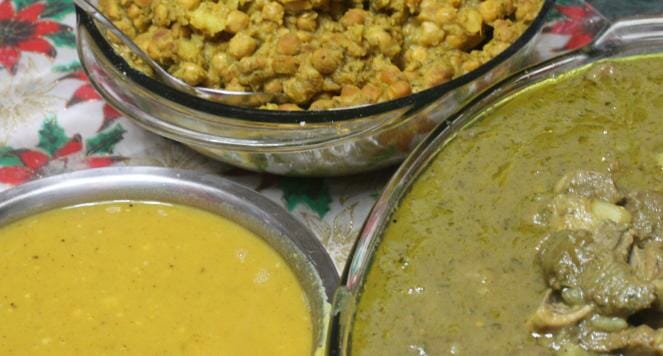Get to Know League of Kitchens, Immigrant Cooking Classes in NYC
Photos courtesy of Meg Cotner
Queens, known as “The World’s Borough,” is the most diverse county in the US. As home to immigrants from around the world, it makes sense that the League of Kitchens, an organization that runs cooking classes taught by immigrant women, would hold some of them in Queens. I had the chance to attend one of them, and I was fortunate enough to get a spot in the Trinidadian Cooking class (disclosure: this class was free of charge). Our group gained so much from our experience – we deepened our appreciation for the art of cooking, expanded our knowledge of cooking techniques, learned about another culture through the lens of food, and took great joy in sharing several traditional dishes with each other.
Classes with the League of Kitchens offer a chance to learn about a new cuisine directly from someone who has lived in it all their life; classes take place in the instructor’s home, where they are most comfortable. In other words, this is the real deal. There are two class types: Immersion, which lasts a total of five and a half hours and includes lunch and several hours of cooking. Taste Of is much shorter at two and a half hours, and involves an hour and a half of cooking and a light snack. All students are given a recipe booklet to take home; ingredients, recipes, and shopping sources are included. You also get to eat everything you cooked, and if you’re lucky, you’ll get to take home leftovers.
Dolly Sirju teaches the Trini class, with roti cooking help from her daughter, Mandy (she’s a serious pro at this). She originally connected with League of Kitchens via an ad on Craigslist (other instructors were contacted through their community’s cultural organization), and after Lisa Gross, the League’s founder, tasted her food – which, in Dolly’s words, “wakes up the mouth” – there was no doubt that she would be part of the League. She now leads three classes a month.
Dolly grew up in Trinidad, moved to Canada, then to Queens, then to Florida, and back to Queens. “This place has everything!” she says about the borough. “I can find anything I need here; it’s like the whole world is in Queens.” She especially loves South Ozone Park. When she was renting she prayed, “If you send me a house please make sure it’s here in this neighborhood.” Thankfully, her prayers were answered.
Her kids love her food. After spending some time in Trinidad, they told her, “Mom, you gotta get into the kitchen and make something for us! Your cooking is the best.” And they’re not joking, her food was excellent. Two of the six attendees had heard of Dolly’s class in particular, and told it was not to be missed.
Indian, African, Spanish, Caribbean and Chinese food cultures influence Trini cuisine, and it can be quite spicy through its use of curry powder and hot peppers; it is incredibly flavorful. We started out the day with a helping of pelau, a traditional Trinidadian stew with chicken, beans, and rice, with a little bit of green salad for lunch. There were six of us, ranging from locals to tourists. We chatted with each other, and everyone enjoyed the spicy food. Conversation was filled with stories and chitchat about what we do and enjoy outside of the class. Dolly shared a number of memories from her life of cooking.
-

-

-

-

-

-

-

-

-

-

-

-

-

-

-

-

-

-

-

-

-

-

-

-

-

-

-

-

-

-

-

-

-

-

-

-

-

-

-

-










































